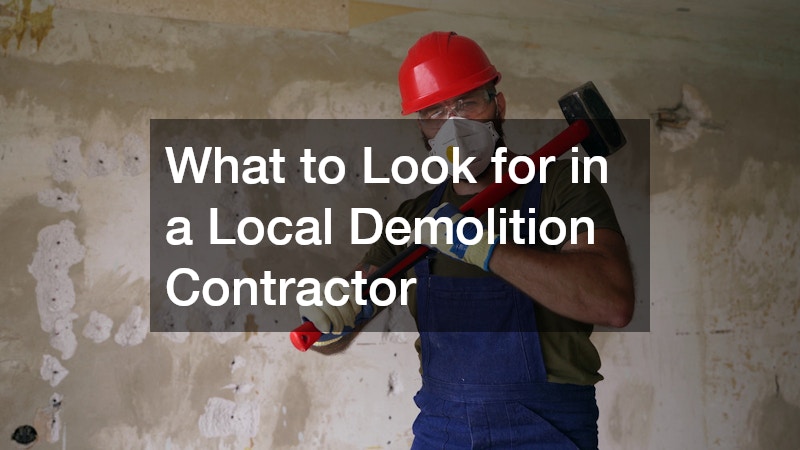
Hiring a local demolition contractor is a crucial first step in preparing a site for new construction, renovations, or property improvements. While tearing down a structure may seem straightforward, the process requires careful planning, specialized skills, and strict adherence to safety and environmental regulations. Choosing the right contractor can make the difference between a smooth project and one that faces costly delays or unexpected hazards.
Video Source
Beyond simply knocking down walls or removing debris, demolition involves coordinating permits, using the right equipment, handling hazardous materials, and ensuring the site is safe for future work. With so many factors at play, it's essential to work with a contractor who isn't only experienced, transparent, reliable, and equipped to meet your specific project needs.
One of the most important considerations when selecting a demolition contractor is their level of experience in the industry. A contractor with a proven track record is more likely to anticipate potential challenges, follow proper procedures, and complete projects efficiently. Experience also often translates to familiarity with local regulations, which can help streamline the approval process and avoid unnecessary delays. Qualifications, such as certifications or industry memberships, indicate that a contractor meets certain professional standards and stays current with industry best practices.
Specifically, you should look for contractors who have handled projects similar in size and scope. For example, a contractor specializing in small residential demolitions may not be suited to a large commercial teardown. Reviewing their portfolio, checking for relevant certifications like OSHA training, and asking for references from past clients can help you determine whether they have the skills and experience to handle your project.
Safety is paramount in demolition, where heavy machinery, falling debris, and potential exposure to hazardous materials can pose significant risks. A reputable contractor prioritizes safety by implementing strict protocols, conducting regular site inspections, and ensuring all crew members are adequately trained. Adhering to federal, state, and local safety regulations helps protect workers, the surrounding environment, and neighboring properties.
In practice, this means asking contractors about their safety records, requesting proof of liability insurance, and confirming that they have safety certifications for their team. It's also worth inquiring how they handle specific hazards, such as asbestos or lead-based materials, that require specialized removal procedures. A contractor who demonstrates a strong commitment to safety from the start is likelier to deliver a project without accidents or compliance issues.
The contractor's equipment and techniques can significantly influence the demolition's environmental impact. Modern demolition often involves more than just wrecking balls; it can include advanced machinery like excavators with specialized attachments, high-reach arms for tall structures, and selective demolition methods that allow for the careful removal of certain materials. Contractors who invest in up-to-date equipment are typically better equipped to work quickly, safely, and with less disruption to surrounding areas.
For example, if your project requires partial demolition to preserve parts of a building, you'll need a coworker who is proficient in precision techniques. Ask about the types of machinery they use, whether they perform manual dismantling when necessary, and how they manage noise and dust control. Contractors who embrace newer, more efficient methods may also be better positioned to recycle materials and reduce waste, which can be cost-effective and environmentally responsible.
Time is often a critical factor in demolition projects, especially when they are part of a larger construction or renovation plan. A reliable contractor will provide a realistic project timeline for permitting, preparation, demolition, and cleanup. They should also be able to adapt to changes without causing significant disruptions to the schedule.
Pay attention to how the contractor communicates during the initial consultation to assess this. Are they responsive to your questions? Do they explain potential delays and how they would handle them? Contractors who maintain open communication channels and provide regular progress updates can help ensure your project stays on track. This proactive approach can prevent minor issues from becoming major setbacks.
Budget is always important, but choosing the lowest bid isn't the right strategy. A trustworthy demolition contractor will offer precise, detailed estimates that outline labor costs, equipment usage, permit fees, and waste disposal charges. Transparency in pricing helps you understand exactly what you're paying for and reduces the likelihood of surprise expenses later on.
When reviewing proposals, ask for a written contract that specifies the scope of work, payment schedule, and terms for any additional charges. This is also the time to discuss how changes to the project—such as uncovering hidden structural issues—will be handled financially. Contractors who are upfront about costs and policies are more likely to deliver a project that meets your budget and expectations.
Selecting the right local demolition contractor requires careful evaluation of their qualifications, safety practices, equipment, communication style, and pricing transparency. Demolition is a complex process that demands technical skill and a strong commitment to safety, regulatory compliance, and client satisfaction. The right contractor will bring a combination of expertise, modern resources, and professionalism that ensures your project is completed efficiently and safely.
By taking the time to research and compare contractors, you can avoid common pitfalls and set your project up for success. Whether preparing or making way for a complete property transformation, partnering with a reliable demolition professional is an investment in your project's safety and future.
